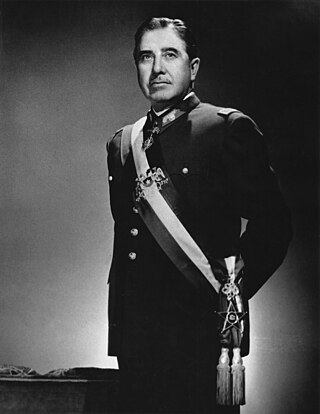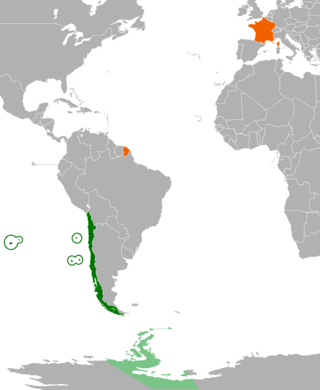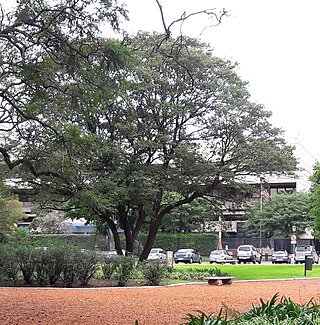
Marcos Orlando Letelier del Solar was a Chilean economist, politician and diplomat during the presidency of Salvador Allende. A refugee from the military dictatorship of General Augusto Pinochet, Letelier accepted several academic positions in Washington, D.C. following his exile from Chile. In 1976, agents of Dirección de Inteligencia Nacional (DINA), the Pinochet regime's secret police, assassinated Letelier in Washington via the use of a car bomb. These agents had been working in collaboration with members of the Coordination of United Revolutionary Organizations, an anti-Castro militant group.
United States intervention in Chilean politics started during the War of Chilean Independence (1812–1826). The influence of United States in both the economic and the political arenas of Chile has since gradually increased over the last two centuries, and continues to be significant.

An authoritarian military dictatorship ruled Chile for seventeen years, between 11 September 1973 and 11 March 1990. The dictatorship was established after the democratically elected socialist government of Salvador Allende was overthrown in a coup d'état backed by the United States on 11 September 1973. During this time, the country was ruled by a military junta headed by General Augusto Pinochet. The military used the breakdown of democracy and the economic crisis that took place during Allende's presidency to justify its seizure of power. The dictatorship presented its mission as a "national reconstruction". The coup was the result of multiple forces, including pressure from conservative groups, certain political parties, union strikes and other domestic unrest, as well as international factors.

On 21 September 1976, Orlando Letelier, a leading opponent of Chilean dictator Augusto Pinochet, was assassinated by car bombing, in Washington, D.C. Letelier, who was living in exile in the United States, was killed along with his work colleague Ronni Karpen Moffitt, who was in the car with her husband Michael. The assassination was carried out by agents of the Chilean secret police (DINA), and was one among many carried out as part of Operation Condor. Declassified U.S. intelligence documents confirm that Pinochet directly ordered the killing.

Myanmar (Burma) and the United States had a diplomatic contact prior to the British colonial period. They established formal diplomatic relations in 1947 in anticipation of Burma's independence.

The relationship between Chile and the United States, which dates back to the 19th century, has improved significantly since 1988 and is better than at any other time in history. In the late 1980s and early 1990s, the US government applauded the rebirth of democratic practices in Chile, despite having supported the 1973 coup d'état and subsequent military regime.

Equatorial Guinea – United States relations are bilateral relations between Equatorial Guinea and the United States.

Eritrea–United States relations are bilateral relations between Eritrea and the United States.

Mozambique – United States relations are bilateral relations between Mozambique and the United States.

Sierra Leone – United States relations are bilateral relations between Sierra Leone and the United States.

David Henry Popper was a diplomat and former United States Ambassador to Cyprus (1969–73) and Chile (1974–77). He was a member and former President of the American Academy of Diplomacy.

Augusto José Ramón Pinochet Ugarte was a Chilean military officer and politician who served as Chile's head of state under various titles from 1973 to 1990, first as the leader of the Military Junta of Chile from 1973 to 1981, being declared President of the Republic by the junta in 1974 and thus becoming the de facto dictator of Chile, and from 1981 to 1990 as de jure president after a new constitution which confirmed him in the office was approved by a referendum in 1980. His rule remains the longest of any Chilean leader.

Chile–Finland relations are foreign relations between Chile and Finland. Chile recognised Finland's independence on June 17, 1919. Diplomatic relations between them were established in 1931 and have been continuously maintained, despite pressures at times to discontinue them. The two countries maintain resident ambassadors in both capitals.

Chile–China relations are foreign relations between the Republic of Chile and the People's Republic of China. Diplomatic relation were established in 1915. Both nations are members of the Asia-Pacific Economic Cooperation and the United Nations.

Chile–Norway relations are foreign relations between the Republic of Chile and the Kingdom of Norway. Both nations are members of the OECD and the United Nations.

Chile–Sweden relations refers to the diplomatic relations between Chile and Sweden. Both nations enjoy friendly relations, the importance of which centers on the history of Chilean migration to Sweden during the 1970s. Approximately 100,000 Chileans and their descendants reside in Sweden, making the country home to the third largest Chilean diaspora community. Both countries are members of the Organisation for Economic Co-operation and Development.

Chile–France relations are the diplomatic relations between Chile and France. Both nations are members of the Organisation for Economic Co-operation and Development, United Nations and the World Trade Organization.

The Embassy of the United States in Buenos Aires is the diplomatic mission of the United States in Argentina. It is within walking distance of Bosch Palace, which is the residence of the United States Ambassador to Argentina.


















